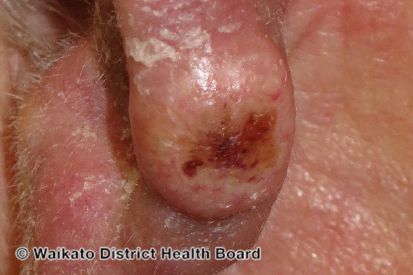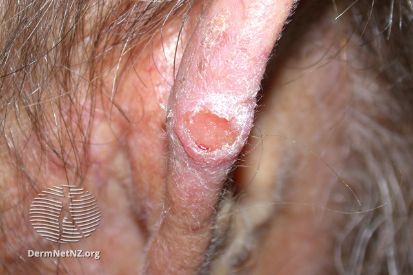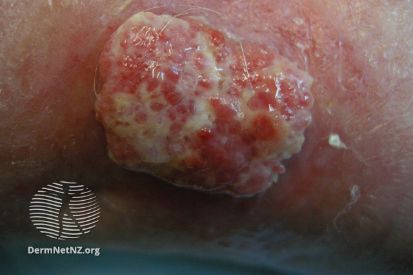Squamous Cell Carcinoma
Understanding Squamous Cell Carcinoma (SCC): The Second Most Common Skin Cancer
Squamous cell carcinoma (SCC) is the second most prevalent form of skin cancer. It typically develops on sun-exposed areas of the skin, including the head, neck, ears, lips, arms, legs, and hands. These regions are most vulnerable to the damaging effects of ultraviolet (UV) radiation, increasing the risk of SCC.
Regular skin checks by a dermatologist at Pinehurst Dermatology & Mohs Surgery Center are essential for the early detection of SCC. Our expert dermatologists have the specialized knowledge to identify suspicious lesions, growths, or skin changes that may indicate SCC. Equally important are self-examinations, which allow individuals to monitor their skin for any unusual or evolving areas, such as persistent sores, rough patches, or raised nodules.
Combining professional assessments with regular self-examinations increases the likelihood of early detection of SCC lesions. Early identification is key to successful treatment and improved outcomes, underscoring the importance of routine checks by dermatologists and vigilant self-exams in maintaining optimal skin health.
At Pinehurst Dermatology & Mohs Surgery Center, we are committed to providing exceptional care and personalized guidance, ensuring that your skin wellness needs are comprehensively addressed with a focus on prevention, early detection, and effective treatment of SCC and other skin conditions.
Examples of Squamous Cell Carcinoma



Warning
This content contains sensitive images.
Symptoms of Squamous Cell Carcinoma
- Squamous cell carcinoma usually begins as a dome-shaped bump or a red, scaly patch of skin.
- Rough and crusty and can bleed easily when scraped.
- Changes in existing growths: changes in the appearance of existing skin growths, such as warts or scars.
- Persistent sore: a sore or lump that doesn't heal, or a lesion that keeps recurring.
What Causes Squamous Cell Carcinoma?
- Squamous cell carcinoma (SCC) can affect individuals across diverse backgrounds.
- It is more prevalent in those with regular exposure to direct sunlight, especially in professions or lifestyles that involve significant sun exposure.
- While skin cancer is less common in individuals with darker complexions, they are at an increased risk for SCC in areas of the body not typically exposed to the sun.
Squamous Cell Carcinoma Prevention
FAQs: Squamous Cell Carcinoma (SCC)
Diagnosis involves a biopsy, where a sample of the suspicious area is removed and examined under a microscope.
Treatment options for SCC depend on factors such as the size, location, and stage of the cancer. Common treatments include surgical excision, curettage, cryotherapy and Mohs surgery for more complex cases.
The frequency of screenings depends on individual risk factors. High-risk individuals, such as those with a history of SCC or other skin cancers, may need more frequent screenings. Consult with your dermatologist to determine the appropriate screening schedule.
While SCC is usually slower-growing than melanoma, it has the potential to be locally aggressive and may spread to other parts of the body, especially if left untreated.
A total body skin exam by a dermatologist is crucial for several reasons. Firstly, it serves as a proactive measure for the early detection of skin cancers, including melanoma, the deadliest form of skin cancer. Skin cancers are often highly treatable when identified at an early stage. A comprehensive examination allows the dermatologist to assess moles, birthmarks, and any unusual skin changes that may indicate potential issues.
Regular skin exams become especially vital for individuals with risk factors, such as a family history of skin cancer, a personal history of sun exposure, or fair skin. Overall, a total body skin exam is a proactive and comprehensive approach to maintaining skin health, preventing skin cancers, and addressing any skin-related issues in a timely manner.
From Our QualDerm Family of Brands: Non-Melanoma Skin Cancers
Treatment Options for Squamous Cell Carcinoma
- Mohs micrographic surgery
- Excisional surgery
- Cryotherapy (freezing)
- Currettage and Electrodessication
- Chemotherapy
- Radiation
Featured Sunscreens
Check your local office for current stock!
Check your local office for current stock!
